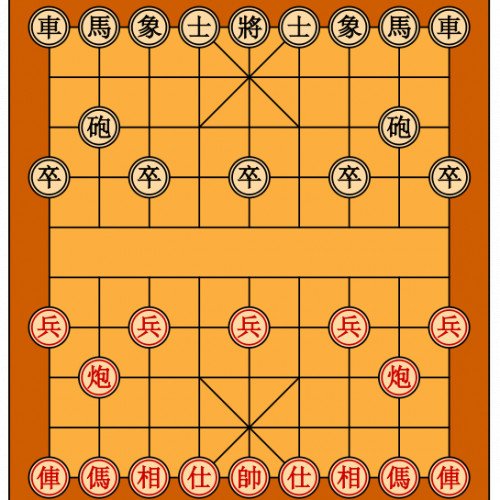DVONN VS XIANGQI

DVONN
DVONN is a two-player strategy board game in which the objective is to accumulate pieces in stacks. It was released in 2001 by Kris Burm as the fourth game of the GIPF Project. DVONN won the 2002 International Gamers Award and the Games magazine Game of the Year Award in 2003. DVONN is played on a board with 49 spaces. The board has a hexagonal layout 5 hexes wide. One player has 23 black pieces to play, the other player has 23 white pieces. There are also 3 neutral red pieces, called DVONN pieces. The object of the game is to control more pieces than your opponent at the end of the game. The game starts with an empty board and proceeds in two phases. During the first phase, the players place their pieces on the board, starting with the three red DVONN pieces. Pieces can be placed on any unoccupied space. White starts, and the players alternate. So Black is the first to place a piece of his own color. The first phase ends when all pieces are placed on the board, filling it completely. The second phase involves the building of stacks of pieces (a single piece is also considered a stack) by moving stacks onto other stacks. A stack is controlled by a player if his color is on top. A stack is immobile if it is surrounded by 6 neighboring stacks. The white player has the first move in this phase. Any mobile stack of height n (with n > 0) can be moved (in a straight line) in any one of the 6 directions by exactly n spaces by the player controlling it, if it lands on another stack. Jumping over empty spaces is allowed, as long as the tower does not land on an empty space. Single DVONN pieces cannot be moved, but they can be once they are part of a stack. After each move, all stacks that are not connected via a chain of neighboring stacks to any stack containing a DVONN piece are removed from the board.
Statistics for this Xoptio

XIANGQI
Xiangqi (Chinese: 象棋; pinyin: xiàngqí; Wade–Giles: Hsiang ch'i; English: /ˈʃɑːŋtʃi/), also called Chinese chess or Elephant chess, is a strategy board game for two players. It is one of the most popular board games in China, and is in the same family as Western chess, chaturanga, shogi, Indian chess and janggi. Besides China and areas with significant ethnic Chinese communities, xiangqi is also a popular pastime in Vietnam, where it is known as cờ tướng. The game represents a battle between two armies, with the object of capturing the enemy's general (king). Distinctive features of xiangqi include the cannon (pao), which must jump to capture; a rule prohibiting the generals from facing each other directly; areas on the board called the river and palace, which restrict the movement of some pieces (but enhance that of others); and placement of the pieces on the intersections of the board lines, rather than within the squares. Xiangqi is played on a board nine lines wide and ten lines long. As in the game Go (圍碁; or Wei ch'i 圍棋), the pieces are placed on the intersections, which are known as points. The vertical lines are known as files (Chinese: 路; pinyin: lù; "road"), and the horizontal lines are known as ranks (Chinese: 線/綫; pinyin: xiàn; "line"). Centred at the first to third and eighth to tenth ranks of the board are two zones, each three points by three points, demarcated by two diagonal lines connecting opposite corners and intersecting at the centre point. Each of these areas is known as 宮 About this soundgōng, a castle. Dividing the two opposing sides, between the fifth and sixth ranks, is 河 hé, the "river". The river is often marked with the phrases 楚河 About this soundchǔ hé, meaning "River of the Chu ", and 漢界 About this soundhàn jiè, meaning "Border of the Han", a reference to the Chu–Han War. Although the river (or Hanchu boundary) provides a visual division between the two sides, only two pieces are affected by its presence: soldiers have an enhanced move after crossing the river, and elephants cannot cross it. The starting points of the soldiers and cannons are usually, but not always, marked with small crosses.